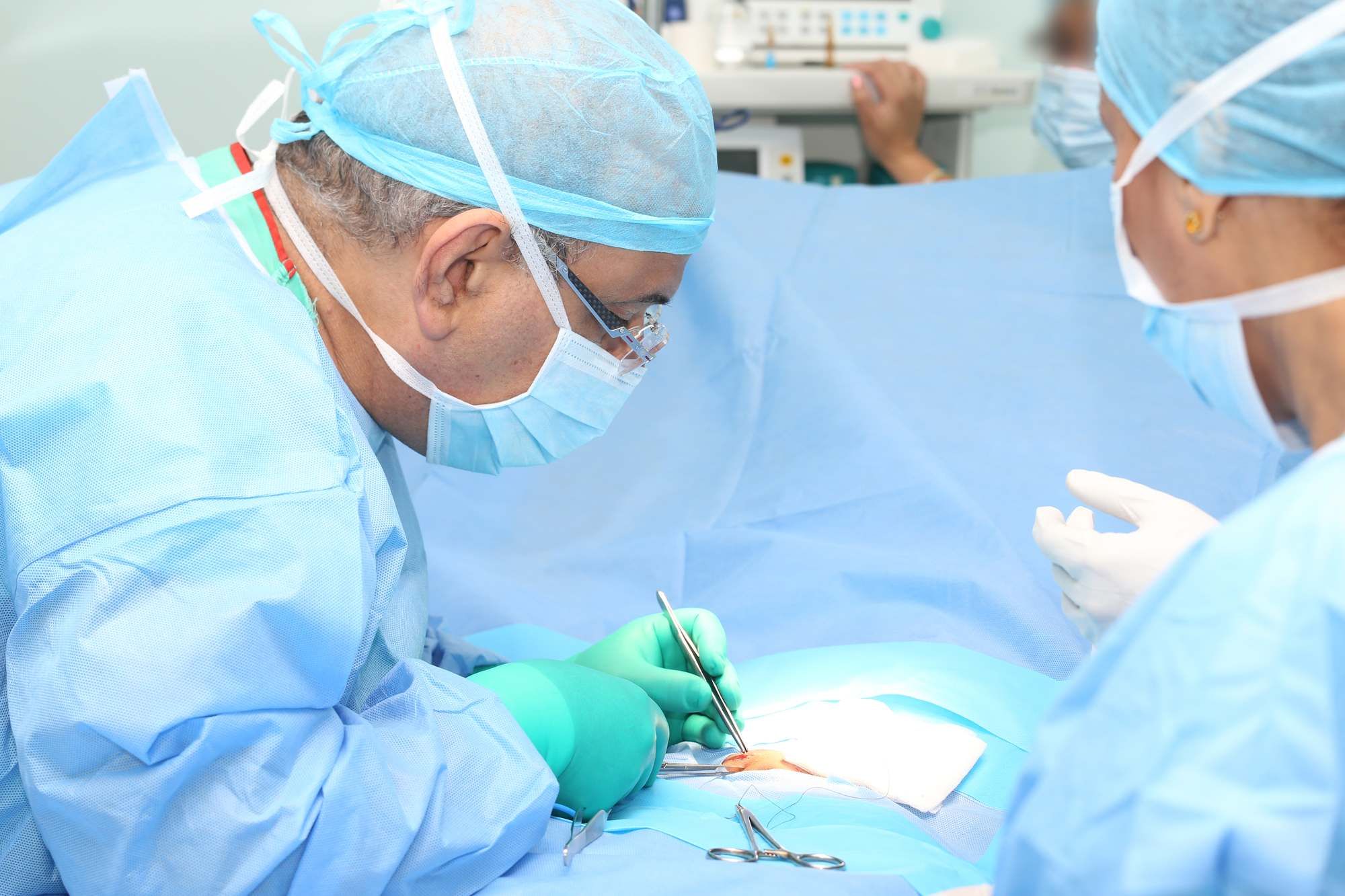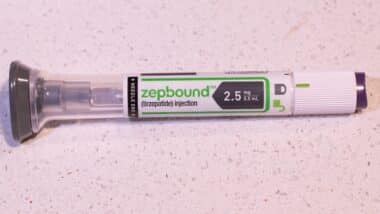
Having a hernia can be uncomfortable, painful and even dangerous and unlike some other medical conditions, hernias don’t heal themselves over time. Often, they require surgery to repair them. These repair procedures often use hernia mesh.
Advances in medicine and medical technology have helped make hernia mesh surgery safer and more effective – in many cases it can be done without even requiring an overnight hospital stay – but there are risks to consider with any implant surgery, such as hernia mesh side effects.
Herniated Mesh Surgery Overview
A hernia is the protrusion of internal organs or tissue through a hole in the body’s muscle wall. The hole is usually created by a tear or weakness. Hernias are typically obvious as the muscle wall is only separated from the skin by a layer of fat and tissue. They tend to create a visible bulge or swelling and cause discomfort.
The most common hernias are in the abdomen, but they can happen in the groin, belly button and upper thigh.
Different types of hernias have different symptoms, and some have no symptoms at all, according to the online consumer health information website Healthline. In some cases, a person can have a hernia and not even know it.
Various factors can set the stage for a hernia to happen by damaging or straining the muscle wall. Physical injury to the muscle wall, lifting heavy weights, multiple pregnancies, constipation and chronic obstructive pulmonary disorder (COPD) have all been known to lead to hernias.
Surgery is the only way to repair a hernia and though not all hernias are life-threatening, many require the surgical fix. Once the hernia causes long-term pain or discomfort to the extent where it interferes with the activities of daily living, most doctors recommend surgery.
Hernia repair surgery consists of putting the displaced organs or tissue back into place and repairing the muscle wall. Hernioplasty is the name for the type of hernia repair surgery in which a mesh patch is used to secure the organs and tissue behind the muscle wall.
How Is Hernia Mesh Attached?
During a hernioplasty, a surgeon places a flat, sterile mesh – usually made of flexible plastic or animal tissue – over the open hernia. The mesh is affixed with stitches or surgical glue to hold it in place.
Some surgical mesh is permanent and some is designed to degrade over time, according to the Stony Brook Comprehensive Hernia Center’s website. The most common mesh is permanent and made of a plastic material that resembles a window screen.
How Does Hernia Mesh Stay in Place?
In the days after surgery, the stitches or glue used by the surgeon to set the mesh hold it in place. Over time though, the patient’s body automatically grows scar tissue around, through and into the mesh, securing it and the abdominal wall even further. Complications may occur if the mesh migrates.
Hernia Mesh Surgery Recovery
Recovery time after hernia mesh surgery depends on the exact type of hernia and the surgical method used to repair it.
Patients with minimal hernias can be operated on in the morning, go home in the afternoon and be up and walking that evening. Those whose surgeries involved major abdominal wall reconstruction can be hospitalized for days.
In the days after surgery, the most common restriction on patients is not to lift anything heavier than 15 pounds for at least the first two weeks, according to the Johns Hopkins Hernia Center’s website. “Though more complicated patients may have differing limitations,” the website states.
Hernia Mesh Pain After Surgery
Pain or discomfort is common in the early days of recovery from hernia mesh surgery and is usually managed with over-the-counter pain medication or some combination of prescription and over-the-counter pain relievers. Typically, the pain related to the surgery itself dissipates during the recovery period.
Is Hernia Mesh Safe?
Some patients have expressed concern over hernia mesh recalls announced by the FDA. These recalls have largely been implemented since March 2010, explains the University of California, Irvine.
Happily, these recalls have been effective in combating the majority of problems linked to hernia mesh. Reportedly, the recalled devices possessed design and manufacturing flaws, which led them to function less well than they should. The majority of meshes not recalled had not been produced with such flaws, and therefore did not have such difficulties, says UCI Health.
No mesh is perfect, and there are always some risks involved with hernia mesh. UCI Health surgeon Marcelo W. Hinojosa summarized the state of affairs, saying that experts are “still looking for that perfect mesh.”
In the interest of further protecting patient safety, and finding that perfect mesh, hernia mesh is still the subject of ongoing research. A 2014 study published in the Journal of the American Medical Association demonstrated the efficacy of hernia mesh. The 2014 study examined 2,000 hernia surgeries performed between 1980 and 2012, and indicated that in surgeries in which hernia mesh was used, a hernia was less likely to recur during a five year period than those in which hernia mesh was not used.
These positive results are part of why hernia mesh is considered the “gold standard” of hernia repair, according to Stony Brook University’s Renaissance School of Medicine. Until about 50 years ago, hernias were not repaired using mesh, and were instead merely repaired by sewing up the hole of the hernia. With this method, hernias reappeared around 25% to 50% of the time. In contrast, when hernia mesh surgery appeared on the scene around 1958 and in the days since, the recurrence rate dropped to less than 10%, says Stony Brook.
Not everyone considers hernia mesh the “gold standard”, however, with more and more patients coming forward with serious complications after hernia mesh was used for hernia repair. These concerns may have been prompted by the highly publicized issues surrounding pelvic mesh. In Australia, for instance, these issues led to a major Senate inquiry in 2018, along with a massive class action lawsuit against Johnson & Johnson. Now, patients with hernia mesh are questioning their symptoms, says Dr. John Garvey, a leading groin surgeon based out of Sydney, Australia.
“People were getting all sorts of strange symptoms but it only just clicked after the pelvic mesh situation came to light that they could be related to inguinal mesh,” Dr. Garvey told 9News.
As a groin surgeon, Dr. Garvey specializes in surgically removing mesh, and has seen “lives turned upside down and destroyed” because of hernia mesh complications, he says, including financial and personal hardship.
“The mind boggles. Decades ago, before mesh was invented, it was just a standard thing, a small operation that could be done under local anesthetic,” Dr. Garvey said. “Now it’s turned into this major catastrophe.”

Data from the UK shows that more than 100 types of hernia mesh were purchased by NHS Trusts between 2012 and 2018, leading some to question their safety, reports the BBC. Many of these products may have avoided undergoing rigorous testing themselves if they were shown to be similar to products that had already been approved and brought onto the market.
How Common Is Hernia Mesh Revision Surgery?
In some cases, patients experience chronic hernia mesh pain that can last for months or even years. And in some of those cases, follow-up surgery is performed to revise or remove the mesh.
The U.S. Food and Drug Administration keeps track of medical devices, including surgical mesh. Reports from the administration have found the most common complications after hernia mesh surgery involve hernia recurrence and scar tissue adhesions, which can lead not only to pain, but can also interfere with the functioning of internal organs including the intestines and cause bowel obstruction.
Patients have also experienced complications because the mesh they were implanted with contracted or moved.
If you or someone you love has suffered side effects from hernia mesh or hernia mesh failure, you may be able to file a lawsuit and pursue compensation. Of course, filing a lawsuit cannot take away the pain and suffering caused by hernia mesh complications, but it can at least help to alleviate the financial burden incurred by medical costs, lost wages, and more.
Join a Free Hernia Mesh Class Action Lawsuit Investigation
Do YOU have a legal claim? Fill out the form on this page now for a free, immediate, and confidential case evaluation. The hernia mesh attorneys who work with Top Class Actions will contact you if you qualify to let you know if an individual lawsuit or class action lawsuit is best for you. [In general, hernia mesh lawsuits are filed individually by each plaintiff and are not class actions.] Hurry — statutes of limitations may apply.
ATTORNEY ADVERTISING
Top Class Actions is a Proud Member of the American Bar Association
LEGAL INFORMATION IS NOT LEGAL ADVICE
Top Class Actions Legal Statement
©2008 – 2025 Top Class Actions® LLC
Various Trademarks held by their respective owners
This website is not intended for viewing or usage by European Union citizens.
Get Help – It’s Free
Join a Free Hernia Mesh Class Action Lawsuit Investigation
An attorney will contact you if you qualify to discuss the details of your potential case at no charge to you.
PLEASE NOTE: If you want to participate in this investigation, it is imperative that you reply to the law firm if they call or email you. Failing to do so may result in you not getting signed up as a client or getting you dropped as a client.
E-mail any problems with this form to: [email protected].












